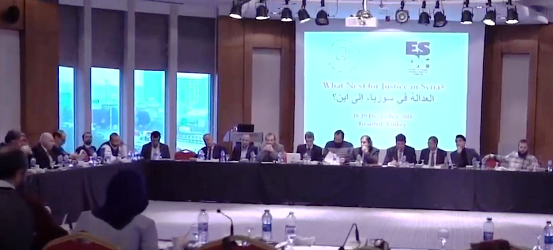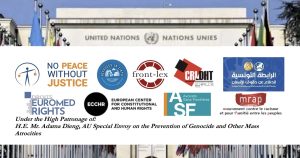After seven years of conflict, the world appears to be pushing for a normalisation of the situation in Syria, focusing on time-limited solutions, like localised ceasefires and the provision of emergency and resilience assistance, or developing long-term plans on constitutional reforms and elections for which the conditions are still lacking. All the while, these external actors are paying little attention to accountability for the crimes that have been committed throughout the conflict. If in the past the international community wanted to raise its voice against war crimes, crimes against humanity, and serious human rights violations in Syria, then now its priority seems to be establishing some form of stability among the many local, regional, and international stakeholders involved in the Syrian conflict through a diplomatic agreement based on normalisation rather than peace.
There have been some results from voices speaking in favour of accountability, like the use of universal jurisdiction to prosecute perpetrators, mostly in EU member states, and the establishment of the IIIM by the UN General Assembly. However, it is clear that those who remain committed to fight impunity and develop genuine Transitional Justice processes must take a different track. There is a need for a renewed long-term strategy for Syria aimed at fostering the pillars of a new Syrian social compact capable of bringing together torn communities, healing the wounds of the past, and providing a shared vision for the future of Syria.
Through this conference, the organizers intended to provide an opportunity for Syrian advocates for justice to reflect on the work done so far on issues related to truth, accountability, and transitional justice, develop new policy strategies with a shared approach, and prepare for the longer-term. The conference can be a moment to develop an effective civil society coalition and a shared understanding of new action priorities, and to guide the actions of those who do continue to support and believe in the efforts of civil society. Towards both of these goals, the conference brought voices from other countries with chequered histories in transitional justice and provide an opportunity for Syrian human rights advocates to learn from their efforts and discuss new avenues for justice.
Documentation
- Final report of the conference
- Chair’s Summary of the conference
- Watch the video on the conference
- Program of the conference
- Concept note of the conference
- Participants’ list
- Visit the special page dedicated to NPWJ’s Syria Project on Justice and Accountability
For further information, please contact Gianluca Eramo (MENA Democracy program Director) on geramo@npwj.org or Nicola Giovannini (Press & Public Affairs Coordinator) on ngiovannini@npwj.org.




